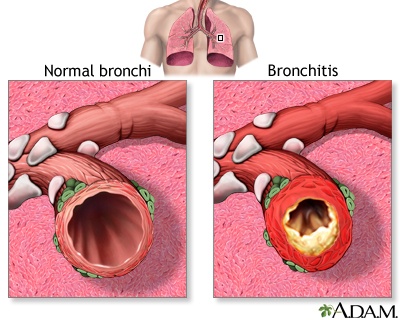Acute Bronchitis: Symptoms, Causes, Treatment,
Author: Giselle Robel
Giselle Robel
Category: Health
Tags: health, acute, bronchitis
What is acute bronchitis?
Acute bronchitis is a contagious viral infection that causes inflammation of the bronchial tubes. These are the airways that carry air into your lungs. When these tubes get infected, they swell. Mucus (thick fluid) forms inside them And this narrows the airways, making it harder for you to breathe.

What is bronchitis?
Your bronchial tubes deliver air from your trachea (windpipe) into your lungs. When these tubes become inflamed, mucus can build up. This condition is called bronchitis, and it causes symptoms that can include coughing, shortness of breath, and low fever.
Bronchitis can be acute or chronic:
- Acute bronchitis typically lasts less than 10 days, but the coughing can continue for several weeks.
- Chronic bronchitis, on the other hand, can last for several weeks and usually comes back. This condition is more common in people with asthma or emphysema.
These two types of bronchitis: acute and chronic. Chronic bronchitis is long- lasting and can reoccur. It usually is caused by constant irritation, such as from smoking. Acute bronchitis lasts only a short time. Most cases get better in several days, though the cough can last for several weeks.
Symptoms of acute bronchitis
The symptoms of acute bronchitis can include:
- Chest congestion or tightness
- Cough that brings up clear, yellow, or green mucus
- Shortness of breath
- Wheezing
- Sore throat
- Fever
- Chills
- Body aches
Your cough can last for several weeks or more. This happens because the bronchial tubes take a while to heal. A lasting cough may signal another problem, such as asthma or pneumonia.
What causes acute bronchitis?
Acute bronchitis is most often caused by a contagious virus. The same viruses that cause colds can cause acute bronchitis. First, the virus affects your nose, sinuses, and throat. Then the infection travels to the lining of the bronchial tubes. As your body fights the virus, swelling occurs and mucus is produced.
You can catch a virus from breathing it in or by skin contact. You are at higher risk of catching the virus if you have close contact with someone who has cold or acute bronchitis.
Lesser-known causes of acute bronchitis are:
- Bacteria or fungal infections.
- Exposure to irritants, such as smoke, dust, or fumes. You are at greater risk if your bronchial tubes already have damage.
- GERD (gastroesophageal reflux disease), which causes heartburn. You can get acute bronchitis when stomach acid gets into the bronchial tubes.
Diagnose
In many cases, acute bronchitis will go away without treatment. But if you see your doctor because of symptoms of acute bronchitis, they will start with a physical exam.
During the exam, your doctor will listen to your lungs as you breathe, checking for symptoms such as wheezing. They'll also you ask about your coughs for instance, how frequent they are and whether they produce mucus. They may also ask about recent colds or viruses, and whether you have other problems breathing.
If your doctor is uncertain about your diagnosis, they may suggest a chest X-ray. This test helps your doctor know if you have pneumonia.
Blood tests and cultures might be needed if your doctor thinks you have another infection in addition to bronchitis.
Acute bronchitis treatment
Most cases of acute bronchitis are caused by a virus. This means that antibiotics won't help. The infection needs to run its course. It almost always goes away on its own. Home treatment focuses on easing the symptoms:
- Drink fluids but avoid caffeine and alcohol.
- Get plenty of rest.
- Take over-the-counter pain relievers to reduce inflammation, ease pain, and lower your fever. These could include acetaminophen (1 brand name: Tylenol) or ibuprofen (1 brand name: Advil). Never give aspirin to a child. It has been linked to Reye syndrome, which can affect the liver and brain.
- Increase the humidity in your home or use a humidifier.
There are some over-the-counter cough medicines that help break up or loosen mucus. Look for the word guaifenesin on the label or ask your pharmacist for a suggestion.
Do not hold in a cough that brings up mucus. This type of cough helps clear mucus from your bronchial tubes. If you smoke, you should quit. It will help your bronchial tubes heal faster.
Some people who have acute bronchitis need inhaled medicine. You might need this if you are wheezing. It can help open your bronchial tubes and clear out mucus. You usually take it with an inhaler. An inhaler sprays medicine right into your bronchial tubes. Your doctor will decide if this treatment is right for you.
If your doctor thinks bacteria have caused your acute bronchitis, he or she may give you antibiotics.
Home care tips
These steps should help relieve your symptoms as you get better.
Do this
- Take OTC nonsteroidal anti-inflammatory drugs, such as ibuprofen (Advil) and naproxen (Aleve, Naprosyn), which may soothe your sore throat.
- Get a humidifier to create moisture in the air. This can help loosen mucus in your nasal passages and chest, making it easier to breathe.
- Drink plenty of liquids, such as water or tea, to thin out mucus. This makes it easier to cough it up or blow it out through your nose.
- Add ginger to tea or hot water. Ginger is a natural anti-inflammatory that can relieve irritated and inflamed bronchial tubes.
- Consume dark honey to soothe your cough. Honey also soothes your throat and has antiviral and antibacterial properties.
Risk factors
- breathing in cigarette smoke, including secondhand smoke
- low resistance to illnesses or a weakened immune system
- gastric reflux
- frequent exposure to irritants, including dust or chemical fumes
- lack of vaccinations for the flu, pneumonia, and whooping cough
- age older than 50 years
Acute bronchitis in children
Children are more likely to develop acute bronchitis than the average adult. This is partly due to risk factors that only affect them, which may include:
- increased exposure to viruses in locations such as schools and playgrounds
- asthma
- allergies
- chronic sinusitis
- enlarged tonsils
- inhaled debris, including dust
Symptoms and treatment
The symptoms of acute bronchitis in children are pretty much the same as those in adults. For that reason, the treatment is very similar as well.
Your child should drink lots of clear fluids and get lots of bed rest. For fever and aches, consider giving them acetaminophen (Tylenol).
However, you shouldn't give OTC medications to children younger than 6 years old without a doctor's approval. Avoid cough medications as well, as they may not be safe.













